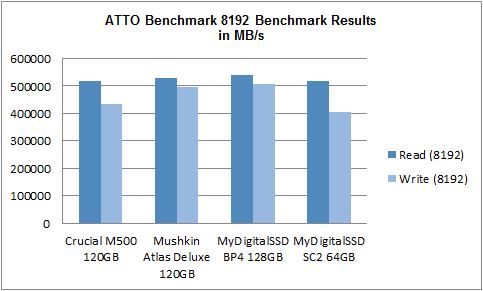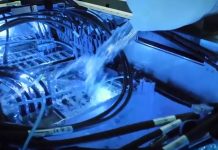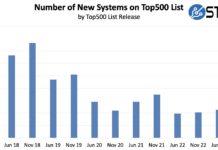Recently we have been gathering mSATA drives that cost under $80 to test in the lab. The premise is simple. There are now many applications that can accept or require mSATA SSDs that need no other local storage. Good examples of this are the Intel NUCs we recently reviewed and the Intel X10SBA platform. Small mSATA drives are relatively inexpensive these days, so building a low cost and low power consumption appliance is very simple.
As a direct result of this, we acquired four drives that could be had for under $80 as of April 15, 2014 and tested them using three simple tests: AS SSD, ATTO and CrystalDiskMark. Certainly not a full test suite but the goal of our testing was simple: find a low cost appliance SSD option. The use case is basically an OS boot drive with some limited local storage. The underlying assumption is that there is a NAS or SAN available to provide mass storage if required.

When looking for drives one fact was readily apparent: specs seemed open to interpretation. We know SSDs scale in performance when their controllers have NAND populating every channel for example. That means some drives may perform significantly differently even within the same family. Manufacturers often try downplaying this fact by listing the top performing model on a spec page for the entire drive family then disclaiming that not every member of the family will perform up to those figures. Fair enough, but that still means there is a lack of data.
The Test
Street pricing does change over time so we set a $80 limit. Since then some drives have become more or less expensive. The four under $80 SSDs we tested were:
- Crucial M500 120GB Review (Amazon link)
- Mushkin Atlas Deluxe 120GB Review (Amazon link)
- MyDigitalSSD BP4 128GB Review (Amazon link)
- MyDigitalSSD SC2 64GB Review (Amazon link)
After peeling back the stickers we did uncover the fact that our Amazon purchased Mushkin Atlas Deluxe was using an inferior SF-2141 controller not the SF-2281 stated on the spec sheet.

That discovery was just part of the eye opening process of looking at the different options.
Quick Benchmarks of the Options
We used three quick benchmarks to get an idea of performance. For the application, a rough understanding of performance is what we were after, not the exact maximums we could tweak settings to achieve. The three benchmarks were: AS SSD, ATTO and CrystalDiskMark. Here is the summary of what can be found in the individual reviews. Feel free to read those (linked above) for more information about the benchmarks used.
AS SSD

ATTO

CrystalDisk Mark

The MyDigitalSSD BP4 128GB SSD can be declared the performance leader in our mSATA SSD roundup.
Comparing Claimed to Actual
In terms of performance, one big factor in purchasing is claimed speeds on a spec page. Of course, post-purchase you have the luxury of testing the drive against what was claimed. We used the sequential read/ write speeds for our tests and compared them to the claimed speeds. If the spec page says “up to” the number we just used the value provided. The results were shocking.

Generally read speeds across benchmarks were in line with expectations. There will inevitably be some variation between ideal lab conditions on a spec sheet and real world performance but the read speeds make sense. Read is the relatively easier side to do well on. Write speeds tend to have more variation in tests, especially in the space constrained mSATA form factor.

One would not realistically expect to see a third party reproduce exactly the spec sheet numbers by simply running quick benchmarks. 5-10% performance variation is nothing out of the ordinary. Here we see a few significant shortfalls. The Mushkin Atlas Deluxe does well in ATTO but also shows the SandForce optimizations clearly. Strangely, the Crucial M500 performs better than expected likely showing the weakness of the ATTO benchmark.
Conclusion
The four drives have each spent about 1 month in light use Hyper-V servers at this point and all four “feel” fine without significant lockups that one could experience with older drives as they saw IOPS asymptotically approach 0 and a resulting system standstill. There was certainly a bit of drama in the roundup. The first Crucial M500 was DOA, but Crucial has been great about the RMA. Mushkin’s business practice of swapping controllers is wholly unacceptable, but the drive still works. The Super Cache 2 64GB was the smallest and slowest of the bunch, but still has acceptable performance for the use case and is by far the least expensive. The MyDigitalSSD BP4 128GB (120GB) drive was the performance standout and a total surprise at that. For a simple objective “buy inexpensive SSDs and run quick benchmarks” much was learned in the process.




